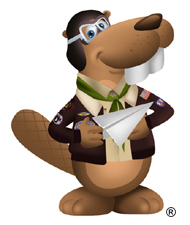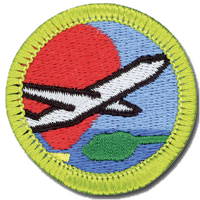Aviation


Resources
Aviation Requirements
Current Scouts BSA requirements
as of February 19, 2026
as of February 19, 2026
1.
Aviation Basics and Mechanics of Flight. Do the following:
a.
Define "aircraft." Describe three kinds of aircraft today, and their
typical uses.
b.
Provide a brief overview of the evolution of flight, and discuss three
notable times in history important to aviation.
c.
Explain the difference between a fixed wing and a rotary wing aircraft,
and the benefits of each.
d.
Explain the operation of piston, turbine, and jet engines.
e.
Using a model aircraft, describe the four forces that act on an
aircraft in flight.
f.
Explain how an airfoil generates lift, specifically noting Bernoulli's
principle.
g.
Identify and describe the aerodynamic control surfaces on the aircraft
of your choice, and explain how they operate to control its attitude
and direction of flight.
h.
Explain the purposes and functions of the various instruments found in
a typical single-engine aircraft: attitude indicator, heading
indicator, altimeter, airspeed indicator, turn and bank indicator,
vertical speed indicator, compass, navigation, communication, and
engine performance indicators.
2.
Principles of Flight. Do ONE of the following:
a.
Build a model FPG-9. Get others in your troop or patrol to make
their own model, then organize a competition to test the precision of
flight and landing of the models.
b.
Build a rubber-band driven balsa wood airplane. Fly the plane for 25
feet in a straight line, with a smooth landing.
c.
Build (or obtain) a fuel-driven or battery-powered electric model
aircraft or drone. Obtain The Recreational UAS Safety Test (TRUST)
certification, and fly the aircraft with a successful take-off and
landing.
3.
Flight Operations. Do TWO of the following:
a.
Using a flight simulator software package, set a course and fly the
headings you have established with a successful take-off and landing.
b.
Under supervision, perform a preflight inspection of an aircraft.
c.
Observe and/or participate in an aircraft maintenance activity.
Describe the maintenance schedule and requirements for an aircraft of
your choice.
d.
Obtain and learn how to read an aeronautical chart. Measure a true
course on the chart; correct it for magnetic variation, compass
deviation, and wind drift to determine a navigational heading for an
aircraft.
e.
With your parent or guardian's permission, take a discovery flight in
an aircraft. Record the date, place, type of aircraft, and duration of
flight. Report on your impressions of the flight.
4.
Airport Operations. Do ONE of the following:
a.
Visit an airport. After the visit, report on how the facilities are
used, how runways are numbered, and how runways are determined to be
"active."
b.
Visit a Federal Aviation Administration facility: Airport Traffic
Control Tower (ATCT), Terminal Radar Approach Control (TRACON), Air
Route Traffic Control Center (ARTCC), or Flight Standards District
Office (FSDO). Report on the operation and your impressions of the
facility.
c.
Visit a military aviation facility. Learn how that facility supports
defense and/or civilian activities. Report on the operation and your
impressions of the facility.
d.
Visit an aviation museum or attend an air show. Report on your
impressions of the museum or show, and what you learned from the
experience.
5.
Personal & Professional Aviation Opportunities. Do the
following:
a.
Explain the following: the student pilot, the recreational pilot, the
remote pilot, and the private pilot certificates.
b.
Describe the benefits of the instrument rating.
c.
Explain the following: the commercial pilot certificate, the airline
transport pilot certificate, and certified flight instructor (CFI).
d.
Identify an Aviation Exploring Post and/or Civil Air Patrol
facility in your area. Learn about their activities and membership
requirements.
e.
Identify three career opportunities that would use skills and knowledge
in aviation. Pick one and research the training, education,
certification requirements, experience, and expenses associated with
entering the field. Research the prospects for employment, starting
salary, advancement opportunities and career goals associated with this
career. Discuss what you learned with your counselor and whether you
might be interested in this career.